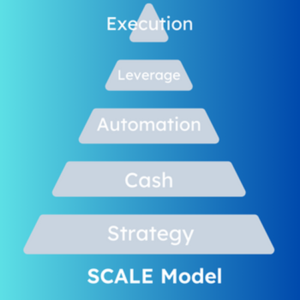Are you an entrepreneur looking for ways to expand your business? Do you dream of taking your company to the next level but need help knowing where to start?
Understanding Business Growth & Scalability
Achieving sustainable growth is essential for long-term success. The first step towards business growth is developing a solid foundation. Identifying target markets and customers is crucial for scalability. Implementing effective growth strategies helps businesses thrive in the long run. Leveraging innovation in operations drives growth opportunities. Understanding business growth and scalability involves:
- Focusing on long-term success factors.
- Attracting new customers.
- Aligning with core values.
- Fostering a dedicated company culture.
CEOs need to allocate many resources to ensure payroll is in line with growth.
Defining Business Growth
Business growth encompasses expanding a company’s size, market share, and profitability. Key business growth indicators include a growing customer base and the expansion of product offerings. Strategic partnerships and industry best practices play a crucial role in successful scaling. To drive business growth, investments in marketing, customer acquisition, and penetration into new markets are essential. Additionally, having a solid team, effective project management, and streamlined internal processes are vital for sustained business growth.
Defining Business Scalability
Business scalability is all about a company’s ability to handle growth while maintaining efficiency. It allows businesses to adapt to market changes, customer demands, and industry trends. Automation, workflow optimization, and scalable operations are critical to achieving scalability. Small businesses can rapidly expand online by implementing scalable ecommerce platforms. Scalability is crucial for long-term success, profitability, and sustainable business growth. It ensures that businesses can grow without sacrificing their core values, company culture, or dedication to their customers. 60% of business owners believe their revenue will continue to grow if they adopt scaling techniques

Importance of Ecommerce Platforms in Business Expansion
Ecommerce platforms are crucial in business expansion, offering digital marketing opportunities to drive online growth. By targeting the right audience and providing a seamless customer experience, businesses can enhance their chances of success in eCommerce. Moreover, choosing the right platform allows small business owners to reach new markets and customers. In contrast, scalable platforms provide the flexibility needed for business growth and product management. Additionally, leveraging social media and email marketing through these platforms can significantly drive business growth.
Role of Technology in Business Growth
Technology drives business growth by enabling automation, scalability, and profitability. By implementing digital tools, the right eCommerce platform, CRM systems, and workflow automation, businesses can streamline their operations and achieve sustainable growth. Leveraging data analytics, customer insights, and market trends empowers businesses to make informed decisions and stay competitive in the digital age. Furthermore, investing in digital marketing, eCommerce platforms, and online visibility can fuel business growth by targeting the right market and adapting to customer needs. In a nutshell, technology is the backbone that supports and accelerates business growth.
Flexibility Offered by Ecommerce Platforms
Ecommerce platforms offer businesses scalability, adaptability, and flexibility for growth. With multiple payment options, customer support, and product customization, they enhance the overall customer experience. Moreover, these platforms enable business owners to tap into new markets, expand their product offerings, and target specific customer segments. Customizable website templates, product catalogs, and marketing tools further facilitate online business growth. By integrating social media, email marketing, and automation features, eCommerce platforms streamline operations, ensuring rapid growth and success. For more on eCommerce platforms, read our article here.

Identifying the Right Time for Scaling Your Business
Identifying the perfect moment to scale your business involves vital growth indicators, such as a growing customer base, increased revenue, and rising market demand. It is essential to keep a pulse on market dynamics, industry trends, and customer feedback to plan for business scaling strategically. Building scalable processes, hiring the right talent, and forging strategic partnerships are crucial success factors in scaling. Long-term sustainability, strong team alignment, and a solid growth strategy are essential for sustainable scalability. Embracing scalable technologies, automation, and workflow optimization supports business scaling effectively.
Indicators of Business Growth
Increasing customer acquisition, market visibility, and profitability indicate successful business growth. Expanding product lines, customer base, and market share signify potential growth opportunities. Achieving business goals, meeting customer demands, and scaling operations demonstrate progress and development. Building strong customer relationships, receiving positive feedback, and gaining industry recognition are signs of a thriving business. Implementing strategic marketing, strong team collaboration, and efficient internal processes contribute to sustainable business growth.
Understanding When to Scale
Knowing when to scale your business is crucial for long-term success. By understanding market opportunities, growth potential, and customer demands, you can determine the right time to scale. Assessing your business goals, available resources, and scalability factors is essential for successful scaling. Monitoring industry trends, competition, and market growth can provide insights into the optimal timing for business expansion. Overcoming bottlenecks, adapting to market changes, and establishing visibility in target markets are signs of business scalability. Ultimately, achieving profitability, efficient business operations, and a solid customer base are key factors in deciding when to scale.
Advantages and Disadvantages of Scaling Your Business
Scaling your business offers numerous advantages that can contribute to its long-term success. By scaling, you can increase your revenue, expand your market share, and enhance brand recognition. However, it’s important to consider the potential disadvantages as well. Scaling may lead to increased costs, more complex operations, and potentially loss of company culture. It’s crucial to develop a clear growth strategy, prioritize customer satisfaction, invest in technology and automation, and establish strong core values to achieve successful business growth and scalability. Monitoring key performance indicators (KPIs) allows you to track progress and make data-driven decisions.
Advantages of Business Growth and Scalability
Regarding business growth and scalability, there are several advantages to consider. First and foremost, they provide opportunities for increased revenue and profitability. By scaling your business, you can expand your customer base and reach a broader market. Additionally, greater resources and staffing enable you to improve your products/services and enhance customer satisfaction. Scaling can also attract investors and business partnerships, which contributes to financial stability. Ultimately, successful scaling can lead to long-term business success and sustainability.
Disadvantages of Business Growth and Scalability
Scaling too quickly can result in a lack of control and a decrease in quality. Rapid growth can strain resources, such as finances and personnel. Maintaining an organization’s core values and company culture becomes more challenging as the business grows. Increased competition and external factors can make scaling more difficult. It’s crucial to consider the pros and cons of business growth before making any decisions. Assessing these potential disadvantages can help businesses navigate the challenges of growth and scalability effectively.
Implementing the S.C.A.L.E. Model for Business Growth
The S.C.A.L.E. model, which stands for Strategy, Cash, Automation, Leverage, and Execution, provides a comprehensive framework for achieving business growth and scalability. It starts with developing a strategic business plan, conducting a target market analysis, and devising effective growth strategies. Managing cash flow and profitability and ensuring sustainable growth are crucial elements of successful scaling. By automating business processes, optimizing workflows, and leveraging technology, companies can drive scalability. Lastly, executing growth strategies, hiring the right people, and forming strategic partnerships are essential for achieving business growth and scalability. According to a study, startups that scale can raise 250% more money than expected. Successful businesses that use scaling can also see 360% user growth

The Significance of the S.C.A.L.E. Model
Implementing the S.C.A.L.E. model is the best way to ensure sustainable business growth and long-term success. By focusing on strategic partnerships, the S.C.A.L.E. model helps identify growth opportunities and target new markets for customer acquisition. It provides a framework for scalability, allowing businesses to adapt and thrive in a rapidly changing market. With the S.C.A.L.E. model, businesses can leverage their core values, company culture, and dedication to execute their growth strategies effectively. In a nutshell, the S.C.A.L.E. model is the last thing any business should overlook when aiming for continuous expansion and success.
Practical Steps to Apply the S.C.A.L.E. Model
To successfully apply the S.C.A.L.E. Model for business growth and scalability, it is essential to take practical steps that align with your goals. Conduct thorough market research to identify your target audience and customer base, providing a solid foundation for your business operations and internal processes. Develop a growth strategy encompassing digital marketing and social media, leveraging these platforms to scale your business efficiently. Additionally, prioritize building a solid team of experts who can contribute their skills and dedication to business growth.
Navigating Challenges in Business Scaling
Overcoming financial constraints is vital when scaling your business. To ensure efficient operations, building scalable processes is essential. Strategic partnerships play a crucial role in overcoming bottlenecks during scaling. Adaptability is key to keeping up with industry changes during the scaling process. Additionally, ensuring visibility in new markets is vital for successful scaling. By addressing these challenges head-on, businesses can navigate the complexities of scaling and achieve long-term growth.
Overcoming Financial Constraints
When it comes to overcoming financial constraints and ensuring business growth, there are several strategies you can implement. Seeking funding opportunities such as business loans or partnerships can provide the capital you need to scale your business. According to a recent study, successful startups raise over 250% more money than anticipated. Implementing cost-cutting measures without compromising growth, focusing on profitability and R.O.I., leveraging automation and workflow management for cost efficiency, and collaborating with industry experts for financial guidance are all essential steps in overcoming financial constraints.
Building Scalable Processes
It is essential to streamline business operations to achieve scalable growth and sustainability. Implementing efficient processes lies at the core of scalability. Organizing workflows through project management tools and creating adaptable processes that can handle increased demand are crucial steps. Investing in scalable ecommerce platforms for online business growth and enhancing customer experience with scalable CRM systems are also recommended. By focusing on these best practices and leveraging N.L.P. techniques, businesses can establish a solid foundation for long-term success.
How Can You Continually Improve and Innovate Your Business?
Ways to continually improve and innovate your business include embracing new technologies, fostering a culture of adaptability, staying updated with industry best practices, and encouraging strategic partnerships for innovative product development.
Is Your Business Ready for the Next Level of Growth?
Assess if your business is prepared for growth by evaluating resources, team members, and processes. Consider customer acquisition and target market potential. Analyze scalability bottlenecks and plan for sustainability. Align business goals with growth opportunities to determine readiness for the next level of growth.
Properly Measure and Track Your Progress
Properly measuring and tracking progress is crucial for achieving business growth and scalability. It starts with setting clear and achievable goals, which are the foundation for assessing progress. Utilizing key performance indicators (KPIs) and data analytics allows for objectively tracking progress towards those goals. Regularly reviewing and adjusting strategies based on progress and feedback ensures continuous improvement. Celebrating successes and learning from failures further enhances progress tracking. Additionally, leveraging technology and automation streamlines processes and improves efficiency. By effectively measuring and tracking progress, businesses can stay on the path to success and achieve long-term growth.
Conclusion
Achieving business growth and scalability requires a strategic approach and a clear understanding of the opportunities and challenges. It’s essential to leverage technology and e-commerce platforms to expand your reach and flexibility. However, scaling your business should be done at the right time, considering growth indicators and understanding when to scale. While there are advantages to business growth and scalability, it’s essential to navigate challenges such as financial constraints and building scalable processes. Implementing the S.C.A.L.E. model can provide a framework for sustainable growth. Lastly, continually improving and innovating your business is crucial for long-term success. Measure and track your progress to ensure you’re on the right path.
Other Articles You May Be Interested In
